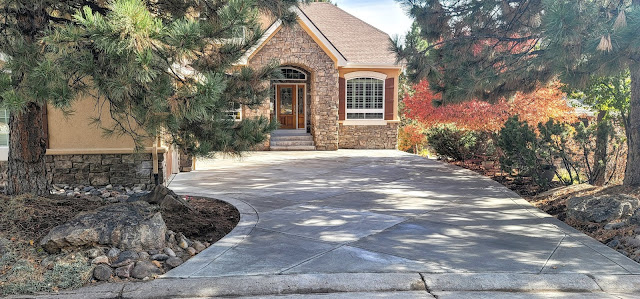Can You Pour Concrete In Freezing Conditions?
Pouring Concrete During Freezing Temperatures
 |
| ABOVE, Castle Pines concrete driveway replacement from Denver Concrete Inc |
When March of 2020 happened, we did not know it, but we were about to begin the busiest season that Denver Concrete Inc has ever known. We are a newer company (although we are not new to concrete with over 50 years of combined experience), so this is our second "busy" season. Regardless, we could have never prepared for the onslaught of business that was about to come our way.
Busy season has definitely not stopped. Our crews are still as busy as they were in the height of busy season. We know that many concrete contractors start to slow down in the fall and winter, however, this is one of the best times to pour concrete in Colorado. Like many concrete contractors, Denver Concrete Inc does not pour in freezing temperatures so for this reason winter is not ideal some of the time.
The 2020 busy season has officially come to a close and we definitely had a fantastic season. We are continuing to work through the winter with limited number of production days due to the upcoming weather that we will be having. So this does beg the question...
Can You Pour Concrete in The Winter?
While it is best to pour in 40°- 60° weather (read more about the perfect weather to pour in here), Denver Concrete Inc pours year round. Our crew and staff time our winter and fall concrete pours so that we do not have to put down blankets, at least a majority of the time. We are asked this question very often about pouring concrete in freezing conditions and we definitely do not advise pouring during freezing temperatures.
With that being said, you can absolutely pour concrete during the winter months in Colorado, you just need to time the pour so that your concrete is not "setting" in freezing temperatures. So what exactly is the problem with pouring concrete in freezing conditions?
The issue with pouring concrete in freezing conditions is that if the concrete freezes before it is "set" or really before the hydration process is complete, the integrity of the concrete after it is cured will be questionable. Hydration is a key process during the curing process of your new concrete. If during the hydration process the concrete is frozen and the water expands, it will not only slow down the curing process but it will even stop the process altogether. If plastic concrete freezes (freezes during its plastic state as a liquid, slump 7" or so), it can lose more than 50% of its compressive strength.


Comments
Post a Comment